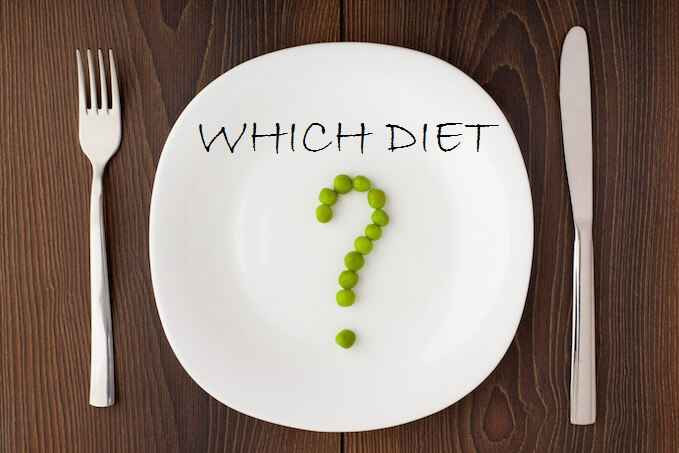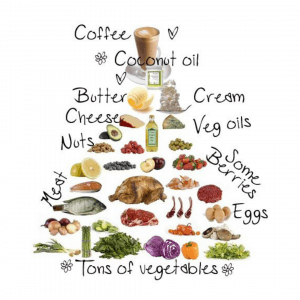What diet is best for me to lose weight, increase muscle mass, improve health and maximise sports performance? This is the ultimate question that everyone wants to know…but what’s the answer?
Throughout the year there is always a time when people are thinking about getting fitter, eating healthier, and looking better. Getting beach body ready for a summer holiday, looking trim for a wedding, or just creating healthy eating habits to stop constantly yo-yo dieting like a New Year’s resolution.
Whatever the goal is, there is always a new trend to promote extreme weight loss methods, gain muscle, and eat healthier, but these are often advocated by a famous face or somebody trying to promote their latest book.
The media is always going to headline these latest fads as people want to know the quickest way to lose weight and look good, but are they really as good as they say?
In my opinion, a lot of these diets are over-hyped. Of the diets that have been introduced in the last decade or so; high fat low carbohydrate (HFLC), low fat, paleo, intermittent fasting (5:2), Atkins, alkaline, juicing/detox diets just to name a few… have all become very popular, yet have also received some form of criticism.
But the question still remains…which diet plan is best in achieving these weight loss and health goals?
I am always interested to listen to people talk about the variety of diets they’ve tried in order to lose weight, and more often than not there’s a common theme of people who’ve tried one ideal diet for a couple of weeks and noticed immediate improvements but then struggled to maintain it.
Following this, they’ll be back to square one and then try another diet and the same thing happens, without any real success.
Facts of extreme weight loss methods
I will now briefly discuss some of the popular diets out there and evaluate the research that supports them.
Paleo/caveman diet
The paleo diet is considered to be the healthiest way of eating because it mimics the foods eaten by our Palaeolithic ancestors (minus the hunting and killing part).
Because of this, it is suggested that this dietary approach is unique by being in sync with your genetics to keep you lean and healthy.
Sound like the answer to your prayers? Hold on to that thought.
|
YES |
NO |
|
Fruits |
Dairy |
|
Vegetables |
Grains |
|
Lean meats |
Processed foods |
|
Seafood |
Legumes |
|
Nuts & Seeds |
Starches |
|
Healthy fats |
Alcohol |
Firstly, let me just point out that there is no evidence to suggest that a paleo-based diet is more beneficial to health than an energy-controlled, macronutrient-matched non-paleo diet.
Secondly, blaming certain food groups for the obesity epidemic is ridiculous. The simultaneous shift in habitual patterns that causes obesity and metabolic disorders are simple due to the fact people are moving a lot LESS and are eating a lot MORE than they used to, not because they ate a slice of cheese on toast.
Also, learn about fresh vs frozen vs canned vegetables for diet!
How it works:
What the paleo diet does do well is that it encourages a variety of meat, seafood, fruit, vegetables, and nuts, which all offer many health benefits when consumed as part of a calorie-controlled diet.
Such eating habits are much more healthier compared to the highly processed contemporary Westernised diet.
However, excluding healthy foods such as dairy, whole grains, and legumes is idiotic as these also contain many important health-boosting properties.
Research Results:
Dairy foods are an excellent source of calcium and in addition to their classical role in bone health, it also lowers blood pressure and risk against cardiovascular disease & type II diabetes (Rice et al., 2013).
Furthermore, increasing dietary calcium through dairy sources can significantly improve fat loss when compared to a diet with a reduced dairy intake that is supplemented with calcium (Zemel et al., 2004).
Legumes are a good source of dietary fiber, protein, and many micronutrients including zinc, iron, and calcium, which together support the management of many chronic diseases (Trinidad et al., 2010).
There is also sufficient research to suggest that whole-grain intake does not negatively impact health, and increased intake may actually be more beneficial in the prevention of weight gain and metabolic diseases (Brownlee et al., 2010; Ye et al., 2012).
Intermittent fasting
Intermittent fasting (IF) has become a popular way of eating in recent years and is proposed to be superior and easier than diets following traditional meal timings for maintaining and achieving and maintaining weight loss and health-related goals.
There are a few regimens used for IF with the general focus of restricting energy intake:
- 1-3 days per week (weekly IF): completely or significantly restrict food/energy intake for a whole 24 hour period, one or more days per week.
- Every other day (alternate day IF): a similar approach to weekly IF but is performed every other day.
- Every day (daily IF): eating just 1-2 meals only every day normally in the afternoon within an 8-hour window (lunch & dinner), and fasting for the other 16 hours in a day.
One reason that IF may appeal to people is the idea that food can be consumed ad libitum on non-restricted days, or for both meals if daily IF.
How it works:
The common goal of IF regimes are to be in a state of energy restriction…is it really that simple, or does IF elicit additional weight loss & health benefits compared to a normal calorie-restricted diet?
There is not much research out there looking at IF, but of the literature available, there do appear to be conflicting findings.
A lot of the studies investigating the effectiveness of IF implement the alternate day IF regime.
IF has been shown to be a successful dietary strategy for weight loss and cardiovascular health (Heilbronn et al., 2005; Varady et al., 2009; Varady et al., 2013), and results may be augmented when combined with endurance exercise (Bhutani et al., 2013).
However, when IF is compared to daily calorie restriction, they appear to be equally beneficial for achieving weight loss and metabolic disease risk reduction (Harvie et al., 2011), including type II diabetes (Barnosky et al., 2014).
To the best of my knowledge, there is only one long-term study comparing IF and continuous dieting for weight loss and metabolic health, with emphasis on weight management and health markers 1 year after the intervention.
Arguin et al. (2012) found that short-term (5 weeks) and long-term (1 year) adherence to IF or daily calorie restriction resulted in similar improvements in weight loss & metabolic health markers in overweight postmenopausal women.
There were however slightly greater losses in fat-free mass (FFM) in the IF intervention group, with no significant differences in the follow-up year.
This did not appear to negatively influence resting metabolic rate, so the severity of the loss of FFM is not too concerning.
When dieting for weight loss, maintenance of FFM is important as significant decreases in FFM can be detrimental to metabolic health.
Research Results:
A recent study showed that meal frequency is very important for FFM preservation during calorie restriction, by comparing the same total energy intake split between either 2 or 6 meals per day (Alencar et al., 2015).
Although weight loss was achieved in both interventions, a significant difference in FFM loss was noticed in the 2 meals per day (-3.3%) compared to the 6 meals per day (+1.2%) intervention.
Dietary protein intake was matched for both conditions at 75g/day, and therefore if you are undertaking an IF regime then a higher daily protein intake is recommended (1.8 – 2g·kg·body weight).
Altogether, the evidence suggests that IF may be a practical dietary strategy for fat loss and health improvements.
Decreases in FFM may also be an issue due to the long fasting hours without dietary protein availability.
Therefore if you are contemplating IF, find a routine that works for you, focus on high-protein snacks/food when you do eat, and remember to exercise!
 Low carbohydrate/high fat (LCHF), ketogenic diet
Low carbohydrate/high fat (LCHF), ketogenic diet
The LCHF diet is a popular ‘diet’ of late, which advocates that an intake of healthy carbs should be limited to less than 25-50g per day.
How it works:
The belief of an LCHF diet is that sugar is what’s causing obesity and all other metabolic diseases.
Thus every meal should be focused on high protein and high-fat foods, causing your body to be fuelled by fat, or ketones, in a metabolic state known as ketosis.
Granted, overconsumption of sugar is a significant factor underpinning poor metabolic health (particularly diabetes as the body may no longer safely regulate blood sugar levels) and obesity.
But to blame this on ALL types of sugar, and not just artificial, nutrient-free sugar is, in my opinion, incorrect.
Research Results:
There is a lot of research to suggest that an LCHF diet can improve a persons’ health and body composition and be superior to a low-fat diet (which will also show improvements when controlled).
This review outlines 23 studies that support LCHF over low-fat diets in both obese and diabetic populations:
(http://authoritynutrition.com/23-studies-on-low-carb-and-low-fat-diets/)
So far it sounds like LCHF diets are the way forward, as the research clearly shows it to be more beneficial compared to a high-carbohydrate diet for both weight management and metabolic health.
However, a lot of these studies only control total energy intake in the low-fat diets and not in the LCHF diets.
So this could simply be that energy restriction was greater in LCHF??
It is possible that a low-carb diet suppresses appetite more than a low-fat diet, however there are many factors to this i.e. fibre content, and it may be more specific to the individual’s personal preferences/responses.(Halton et al., 2004).
Another limitation for most of the studies is that energy expenditure is not measured.
Tay et al. (2008) (study no. 18) showed that matched energy-restricted LCHF vs HCLF diets resulted in similar decreases in body weight (non-statistically different) across 24 months.
The low-carb group did lose slightly more weight (1.8kg) but this is a very small difference that could be attributed to factors like hydration status.
This study did however demonstrate the significant benefits of reduced carbohydrate intake for improved metabolic health.
In another study by Brinkworth et al. (2009) (study no. 20), the same findings were noted as non-statistically different weight loss was observed between isocaloric LCHF and LFHC diets, but markers of metabolic health were significantly improved following LCHF intervention across 12 months.
Guldbrand et al. (2012) (study no. 23) is an interesting study that was performed in type II diabetics and gave dietary advice and education instead of simply providing menus and portion control instructions.
Unlike the previous two studies which fed just 4% daily intake from carbohydrates in the LCHF intervention and 40% in the high-carb group, this study fed 20% in the low-carb diet, and 55-60% in the high-carb diet.
This may therefore not be considered low enough for LCHF advocates.
Nonetheless, this 2 year-long study showed no differences in weight loss between the two isocaloric diets.
More interestingly, significant improvements in insulin dose and control, initial improvements (6 months) in glycated hemoglobin (HbA1c), & increases in HDL-cholesterol were observed in the low-carb group.
Taken together, large reductions in carbohydrates do offer metabolic and cardiovascular health benefits over high-carbohydrate diets.
It may also be a suitable alternative dietary approach for achieving weight loss goals, particularly in obese individuals.
However, when compared to energy-matched high carbohydrate diets, similar weight loss is observed.
Furthermore, moderate carbohydrate diets supplying up to 20% of daily energy may be adequate to elicit positive health benefits in type II diabetics, and although extremely low carbohydrate diets may offer additional benefits, this is not essential.
Also Learn About New Year’s Diet Plans.
Concluding statement
So, what diet is best for you to fulfil the nutrition requirements for adults? After reviewing each available diet that is supposedly superior to the generic daily calorie-restricted diet for weight loss and health, there is quite clearly a common theme. Regardless of what you’re eating, the most important factor for any weight loss diet is that you must be in a negative calorie balance.
Simply put, calories in (food) must be less than calories out (energy expenditure).
As long as you are achieving this then you will lose weight. Simple.
However, this now becomes slightly more complicated as you want to ensure a healthy weight loss is achieved.
With this in mind, weight loss should be termed fat loss, as a significant reduction in lean mass is detrimental to health.
Therefore, increasing dietary protein intake will stimulate muscle protein synthesis and thus attenuate losses in lean tissue.
Furthermore, increasing dietary protein can support weight loss by improving satiety (reduce feelings of hunger) and also via its superior thermogenic effects on fat and carbohydrate, as the body must use more energy to metabolize protein, thus expending more calories (Halton & Hu, 2004).
Whey protein may also produce greater thermic effects than casein and soy (Acheson et al., 2011).
It must be stressed, however, that although a significant difference in thermic response to protein ingestion was observed, this can be as small as 10kcal, and therefore should not be interpreted as a valid excuse to eat a lot more food, even high in protein.
Total calories are more important!
Moving onto carbohydrates and fats. Carbohydrates have been heavily criticized as the demon macronutrient in recent years for causing obesity, diabetes, and, well, pretty much every metabolic disease, hence the LCHF & paleo diets.
Granted, overconsumption of refined sugars and processed foods is now being recognised for their negative impact on health and should be removed from the diet.
However, without going into too much of a rant, carbohydrates are still an important part of the diet, especially for sports performance.
Carbohydrate in the form of muscle glycogen is the primary energy source for high-intensity bouts of exercise >70% VO2max (Romijn et al., 1993), therefore improving performance (Bergstrom et al., 1967).
If you undertake regular exercise training then use carbohydrates to your advantage and support your training before and after to maximise performance and recovery.
Also, consume plenty of carbohydrates in the day(s) before the competition to prepare effectively.
Fats are also an essential part of the diet with many health-related properties e.g. transporting fat-soluble vitamins A, D, E, & K, and also hormone production, but it is also the main energy source during a low-intensity activity like sitting and walking.
Again, without going into too much detail, fats should be added to a balanced diet from the best sources, not heavily processed foods containing vegetable oils and trans fats.
For example, oily fish like salmon, sardines, and mackerel are great sources of omega-3 fatty acids that have a wealth of health benefits.
However overconsuming fat in replace of carbohydrates and fat may be disadvantageous for the weight (higher in calories) and also performance.
Personally, I’m still not convinced that the LCHF diet is the way to go, particularly for athletes.
On the other hand, reducing carbohydrates especially refined and starch-based sources in clinical populations is definitely a nutritional strategy to abide by.
However, this brings me to my conclusion and the most important point of this blog. The best diet for achieving your weight loss, health, and sports performance goal is the one that you can stick to!
If you are currently on a diet that has a name, e.g. paleo, then you’re likely to be restricting nutritious foods for no valid reason, other than that’s the rules of that diet. Create eating habits that allow a healthy lifestyle! Juice and soup diets can provide you with the additional required amount of vitamins and minerals, but depending on juice diets to lose weight may harm you. Read the truth about detox and juice diets in detail.
Adherence is the key to any successful diet!
There is no quick fix!
References
Acheson, K. J. et al. (2011) Protein choices targeting thermogenesis and metabolism. American Journal of Clinical Nutrition, 93, 525-534. http://ajcn.nutrition.org/content/93/3/525.full.pdf+html
Alencar, M. K. et al. (2015) Increased meal frequency attenuates fat-free mass losses and some markers of health status with a portion-controlled weight loss diet. Nutrition Research, 35, 375-283. http://www.ncbi.nlm.nih.gov/pubmed/25862614
Arguin, H. et al. (2012) Short- and long-term effects of continuous versus intermittent restrictive diet approaches on body composition and the metabolic profile in overweight and obese postmenopausal women: a pilot study. Menopause, 19, 870-876. http://www.ncbi.nlm.nih.gov/pubmed/22735163
Barnosky, A. R. et al. (2014) Intermittent fasting vs daily calorie restriction for type 2 diabetes prevention: a review of human findings. Translational Research, 16, 302-311. http://www.ncbi.nlm.nih.gov/pubmed/24993615
Bergstrom, J., Hermansen, L., Hultman, E., & Saltin, B. (1967). Diet, muscle glycogen and physical performance. Acta Physiologica Scandinavica, 71, 140–150. http://www.ncbi.nlm.nih.gov/pubmed/5584523
Bhutani, S. et al. (2013) Alternate day fasting and endurance exercise combine to reduce body weight and favorably alter plasma lipids in obese humans. Obesity, 21, 1370-1379. http://onlinelibrary.wiley.com/doi/10.1002/oby.20353/epdf
Brinkworth, G. D., et al. (2009). Long-term effects of a very-low-carbohydrate weight loss diet compared with an isocaloric low-fat diet after 12 months. American Journal of Clinical Nutrition, 90, 23-32. http://ajcn.nutrition.org/content/90/1/23.full.pdf+html
Markers of cardiovascular risk are not changed by increased whole-grain intake: the WHOLEheart study, a randomised, controlled dietary intervention. British Journal of Nutrition, 104, 125-134. http://www.ncbi.nlm.nih.gov/pmc/articles/PMC3501710/pdf/ukmss-47832.pdf
Guldbrand, H. et al. (2012). In type 2 diabetes, randomisation to advice to follow a low-carbohydrate diet transiently improves glycaemic control compared with advice to follow a low-fat diet producing a similar weight loss. Diabetologia, 55, 2118-2127. http://link.springer.com/article/10.1007%2Fs00125-012-2567-4
Halton, T.L., & Hu, F. B. (2004) The effects of high protein diets on thermogenesis, satiety and weight loss: a critical review. Journal of the American College of Nutrition, 23, 373–385. http://www.ncbi.nlm.nih.gov/pubmed/15466943
Harvie, M. N. et al. (2011). The effects of intermittent or continuous energy restriction on weight loss and metabolic disease risk markers: a randomised trial in young overweight women. International Journal of Obesity, 35, 714-727. http://www.ncbi.nlm.nih.gov/pmc/articles/PMC3017674/pdf/nihms224118.pdf
Heilbronn, L. K. et al. (2005) Alternate-day fasting in nonobese subjects: effects on body weight, body composition, and energy metabolism. American Journal of Clinical Nutrition, 81, 69-73. http://ajcn.nutrition.org/content/81/1/69.full.pdf+html
Rice, B. H., et al. (2013) Meeting and exceeding dairy recommendations: effects of dairy consumption on nutrient intakes and risk of chronic disease. Nutrition Reviews, 71, 209-223. http://onlinelibrary.wiley.com/doi/10.1111/nure.12007/epdf
Romijn, J. A., et al. (1993) Regulation of endogenous fat and carbohydrate metabolism in relation to exercise intensity and duration. American Journal of Physiology, 265, E380-E391. http://www.ncbi.nlm.nih.gov/pubmed/8214047
Tay, J. et al. (2008) Metabolic effects of weight loss on a very-low-carbohydrate diet compared with an isocaloric high-carbohydrate diet in abdominally obese subjects. Journal of the American College of Cardiology, 51, 59-67. http://www.sciencedirect.com/science/article/pii/S0735109707032597
Trinidad, T. P., et al. (2010). The potential health benefits of legumes as a good source of dietary fibre. British Journal of Nutrition, 103, 569-574. http://www.ncbi.nlm.nih.gov/pubmed/19825218
Varady, K. A. et al. (2009). Short-term modified alternate-day fasting: a novel dietary strategy for weight loss and cardioprotection in obese adults. American Journal of Clinical Nutrition, 90, 1138-1143. http://ajcn.nutrition.org/content/90/5/1138.full.pdf+html
Varady, K. A. et al. (2013). Alternate day fasting for weight loss in normal weight and overweight subjects: a randomized controlled trial. Nutrition Journal, 12, 146-154. http://www.ncbi.nlm.nih.gov/pmc/articles/PMC3833266/pdf/1475-2891-12-146.pdf
Ye, E. Q. et al. (2012) Greater whole-grain intake is associated with lower risk of type 2 diabetes, cardiovascular disease, and weight gain. Journal of Nutrition, 142, 1304-1313. http://jn.nutrition.org/content/142/7/1304.long
Zemel, M. B. et al. (2004) Calcium and dairy acceleration of weight and fat loss during energy restriction in obese adults. Obesity Research, 12, 582-590. http://www.ncbi.nlm.nih.gov/pubmed/15090625




 Low carbohydrate/high fat (LCHF), ketogenic diet
Low carbohydrate/high fat (LCHF), ketogenic diet



